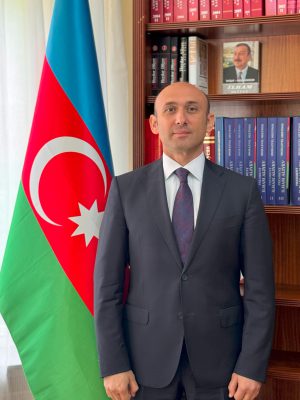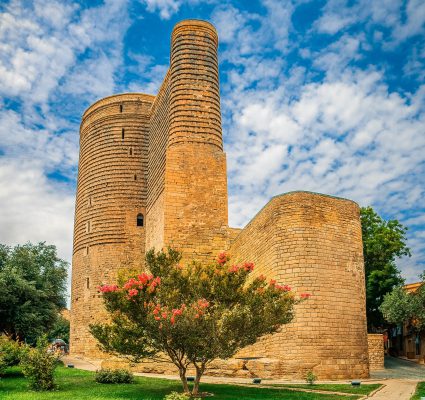Nanda Jagusiak-Monteiro interviews the Ambassador of the Republic of Azerbaijan, H.E. Mr. Mammad Ahmadzada.
You have been the Ambassador of Azerbaijan to the Netherlands since January 2025. What are your first impressions?
My impressions align with expectations. The Netherlands is a country of beautiful landscapes, rich history and cultural heritage, strong statehood traditions, a dynamic economy and an innovative society. The first few months here have been very intense filled with numerous meetings, events and travels. I believe our people need to get to know each other better, and there is a great potential to further develop our relations.
This interview is taking place on the eve of the Independence Day of Azerbaijan. What is the significance of this day in the history of your country?
Independence Day holds a special place in the heart of every Azerbaijani. On 28 May 1918, the Azerbaijan Democratic Republic – the first secular democratic republic in the Muslim East – was established. Although it lasted only 23 months, it laid the foundations of our statehood, including universal suffrage, granting women the right to vote even before many European countries. The Azerbaijani people restored the state independence in 1991 based on the historical legacy and the rich statehood traditions of the Azerbaijan Democratic Republic.
28 May remains a symbol of our nation’s aspiration for freedom and sovereignty. It is a day of pride and reflection – a moment to honor those who fought for independence and to celebrate the achievements of modern Azerbaijan.
In the last 34 years since the restoration of its independence, Azerbaijan has emerged as a middle power due to its geographic advantage, diplomatic agility, resource management, economic and military capabilities. As the largest economy in the South Caucasus, Azerbaijan is actively shaping the region through investments in transport and energy projects both within and beyond the region.
Azerbaijan is known as the Land of Fire, thanks to its natural phenomena – sources of eternal fires and vast energy resources.
What is the role of Azerbaijan in the energy security of Europe?
Azerbaijan is a key energy supplier for many countries, thanks to its strategic use of its natural resources and its role in major energy infrastructure initiatives. Baku-Tbilisi-Ceyhan oil pipeline and the Southern Gas Corridor, realized by Azerbaijan, are instrumental in ensuring Europe’s energy security.
MoU on a Strategic Partnership in the Field of Energy, signed between Azerbaijan and the European Union in 2022, includes to double Azerbaijani gas exports to the EU by 2027 and to generate electricity from renewable energy sources in Azerbaijan for export to Europe. We have consistently increased our gas exports to Europe and now supply gas to ten European countries. Azerbaijan also has huge potential to become a renewable energy powerhouse. Together with Georgia, Romania and Hungary we are developing the Green Energy Corridor to transmit electricity from the Caspian Sea to Europe. We are also working with Central Asian partners – Kazakhstan and Uzbekistan – to involve them in this project.
In November 2024, Azerbaijan successfully hosted COP29, achieving historic results such as Baku Finance Goal, framework for carbon markets, and launch of the Loss and Damage Fund.
All these efforts demonstrate that Azerbaijan is not only a traditional energy supplier, but also a future-oriented partner committed to a secure, diversified, and sustainable energy future for Europe and beyond.
How would you describe the relations between Azerbaijan and the Netherlands?
This year, we celebrate 33 years of diplomatic relations. The mutual establishment of our embassies in the 2000s gave impetus to our relations, paving the way for official visits, mutual investments, and cultural and educational exchanges. The Azerbaijani community in the Netherlands serves as a bridge connecting our countries. The Netherlands’ high-quality educational system has made it one of the top destinations for numerous Azerbaijani students.
However, much potential remains untapped. I believe there is limited awareness in the Netherlands about this potential, the realities of Azerbaijan, its leadership in the South Caucasus and key role in the Caspian Basin, and its strategic position as a gateway to the wider region, including Central Asia.
In addition, perceptions about the former Armenia- Azerbaijan conflict and the post-conflictsituation have been heavily influenced by the disinformation and fake news.
The recent meetings and contacts at the governmental level, including between foreign ministers, as well as the political consultations between our Ministries of Foreign Affairs in Baku have been very helpful in understanding our position and the realities in our region.
All these also provided momentum for discussing the issues of common interest and identifying new avenues for cooperation. Positive outcomes are already being seen.
Since arriving, I have met with numerous government officials, parliamentarians and politicians from various parties, and representatives from think tanks, academia, business, and media. My conclusion: our contacts should be dynamic and constant; our relations should be focused on pragmatic, practical and mutually beneficial cooperation; our countries can complement each other in areas such as natural resources, capital, technology and infrastructure, and build a real partnership.
I take advantage of the opportunity to also address the developments following the liberation of Azerbaijan’s territories from the military occupation and the restoration of its territorial integrity. Since the beginning of 2021 my country initiated a three-track process to normalize relations with Armenia: signing of a peace treaty;border delimitation and demarcation; and reopening of transport links. Azerbaijan first presented the basic principles, and later the draft of the peace treaty, as well as has been in favor of direct dialogue between the two countries.
In parallel, Azerbaijan with its own financial resources has carried out major restoration and reconstruction works in the liberated areas. The contamination of these territories with millions of landmines creates a huge obstacle to these works and poses a serious threat to human life, with 400 casualties reported during the last 4 years.
We are currently closer to achieving peace than ever before. The text of peace treaty has been negotiated. A prerequisite for its signing is the amendment of Armenia’s constitution, which contains territorial claims against Azerbaijan, as well as dismantling dysfunctional structures such as the OSCE Minsk Group, which failed to resolve the conflict. From the very beginning of the negotiations Azerbaijan has consistently raised these two issues. The Hague, the global capital of peace and justice, is the right place to state that Azerbaijan restored historical justice and international law, and has consistently demonstrated a commitment to peace, offering concrete proposals and exercising strategic patience and responsibility. Now it is time to turn the page on hostilities and move to a new era of peace in the region. Peace cannot rest on words alone, but must be built through real deeds. Therefore, Armenia should act swiftly to remove the two aforementioned obstacles. A stable and economically integrated South Caucasus is within reach. It will benefit not only Armenia and Azerbaijan but the broader region, linking Europe, the Caspian Basin and Central Asia through new strategic bonds and corridors.
We hope the evolving situation in your region will create new opportunities for Dutch companies. In this regard, it would be interesting to know about the current state and prospects of Azerbaijani-Dutch economic relations?
Economic cooperation is a cornerstone of relations between Azerbaijan and the Netherlands, characterized by steady growth in trade, investment, and joint projects. As of 2024, around 130 Dutch companies operate in Azerbaijan. Dutch investments in Azerbaijan total about USD 1.5 billion, mainly in non-oil sectors, aligning with Azerbaijan’s strategic goal of economic diversification. Azerbaijani investment in the Netherlands exceedsUSD 2.5 billion. Bilateral trade increased by 60% in 2024 compared to the previous year, reflecting higher import of industrial goods and technology from the Netherlands, and growing energy exports from Azerbaijan.
Agriculture and water management are prominent areas of cooperation. Dutch expertise in sustainable agriculture, greenhouse technology, and water management has contributed to modernizing Azerbaijan’s agricultural sector. This collaboration can enhance food security and productivity. Given Azerbaijan’s focus on environmental sustainability, Dutch companies are also involved in water rehabilitation projects. In 2024, the minister of agriculture of Azerbaijan visited the Netherlands to deepen cooperation in these areas.
Azerbaijan’s strategic location makes it a key transit hub between Europe and Asia, playing a pivotal role in the development of the Middle Corridor. Dutch companies have participated in engineering works at the Port of Baku, enhancing its capacity as a multimodal hub. Future projects will focus on sea port expansion, shipbuilding, transport, infrastructure and logistics.
With Azerbaijan’s commitment to increase the share of renewables in its energy mix, there is substantial potential for collaboration with Dutch companies in wind, solar, and other renewable energy technologies.
I encourage Dutch export-oriented manufacturers to invest in the Alat Free Economic Zone (AFEZ) – a regional investment hub with a strategic location, modern infrastructure, and fiscal and non-fiscal incentives.
Azerbaijan is becoming a popular travel destination. Which highlights can you recommend to Dutch tourists? Azerbaijan is located at the crossroads of East and West, where ancient history and rich culture meet modern architecture and innovation. Baku, the dynamic capital, combines medieval architecture with futuristic landmarks such as the Heydar Aliyev Center and the Flame Towers. The Old City of Baku, a UNESCO World Heritage Site, offers a journey through centuries of history, with its narrow streets, stone buildings, and ancient caravanserais.
Nature and adventure lovers will appreciate Azerbaijan’s diversity, with nine climate zones – from snowy mountains to subtropical lowlands. Iconic sites near Baku include the Atashgah Fire Temple, Yanar Dag (the Burning Mountain), and Gobustan National Park, another UNESCO-listed site. The Caucasus Mountains offer excellent opportunities for hiking and winter sports. Sheki, also a UNESCO-listed site, is known for the stunning Khan’s Palace and unique stained-glass art. Gabala and Nakhichivan feature beautiful scenery, traditional crafts, and rich culinary experiences. Naftalan offers a wellness experience with therapeutic oil baths.
In recent years, Azerbaijan has gained recognition for hosting major international events, such as the Formula 1 Grand Prix and various music and cultural festivals. With direct flights from major European cities, warm hospitality, diverse cuisine, and a strong emphasis on safety and quality service, Azerbaijan offers a unique experience for every traveler.

